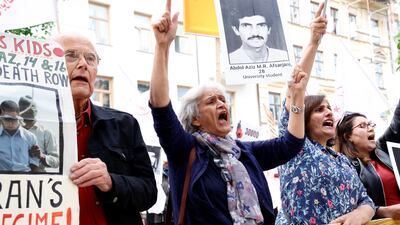A former Iranian prison official on trial in Sweden has denied involvement in the 1988 execution of thousands of political dissidents.
Hamid Nouri, 60, appeared relaxed and smiling in the Stockholm District Court on Tuesday as his trial began.
His lawyer Daniel Marcus denied the charges of murder and war crimes over 18 days in 1988, when Mr Nouri worked at Gohardasht Prison in Karaj, near Tehran.
The principle of universal jurisdiction means Sweden's courts can try a person on serious charges, such as murder or war crimes, regardless of where the alleged offences took place.
Mr Nouri, who was assistant to the deputy prosecutor at the jail, is accused of helping to process blindfolded prisoners before they appeared before three-man death committees, which pronounced verdicts after summary trials.
Victims have identified newly inaugurated Iranian President Ebrahim Raisi as an outspoken member of the committees, enmeshing events of three decades ago with the current leadership and direction of the country.
Mr Raisi, the former head of Iran's judiciary, was accused by Amnesty International in 2018 of being a member of a "death commission" that was behind the secret executions.
He has previously paid "tribute" to former Iranian supreme leader Ayatollah Ruhollah Khomeini's "order" to carry out the purge.
Prosecutor Kristina Lindhoff Carleson read out the charge sheet that accused Mr Nouri of "intentionally taking the life of a very large number of prisoners sympathetic to or belonging to the People's Mujahedin [MEK]".
The trial is expected to run until April 2022.
The MEK supported the 1979 revolution but turned against the new leadership and fought for Saddam Hussein’s Iraqi forces during the Iran-Iraq War.
Thousands accused of being supporters of the group were held in jails across the country.
At the conclusion of the war, prisoners were told to denounce the group, and those who did not were taken to the gallows, witnesses have said.
Many were buried in secret at sites across the country. Families were often kept in the dark about the fate of loved ones and only realised they had been killed when presented with a bag of their personal effects.
MEK supporters were among several hundred protesters who gathered outside the court carrying images of the dead on Tuesday.
They called for justice for the estimated 5,000 prisoners killed across Iran, allegedly under the orders of Khomeini in response to attacks carried out by the group.
Mr Nouri was arrested when he flew to Sweden with a plan to resolve a family issue, after he had been tricked into travelling by former victims.
The accusations were brought to the attention of the Swedish authorities by a group of 30 complainants, including former political prisoner Iraj Mesdaghi.
"This is the first time that one of the persecutors has been held accountable in another country," Mr Mesdaghi said.
In May, a group of 150 Nobel Prize winners, former heads of state and former UN officials called for an international investigation into the executions.

